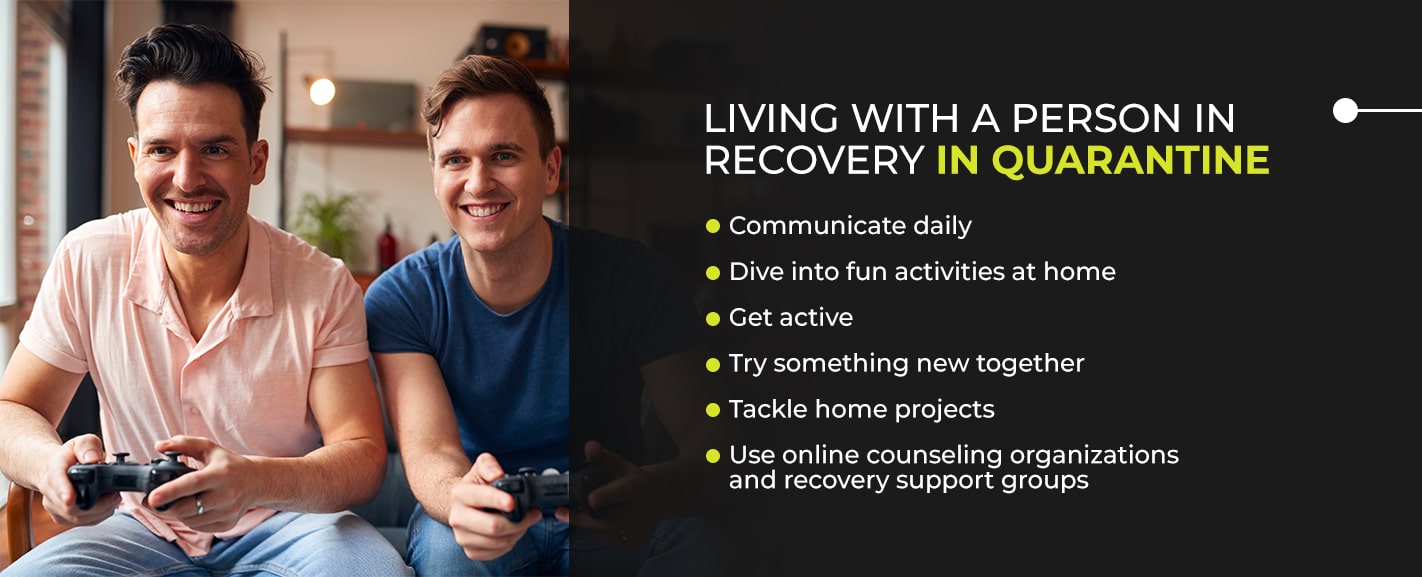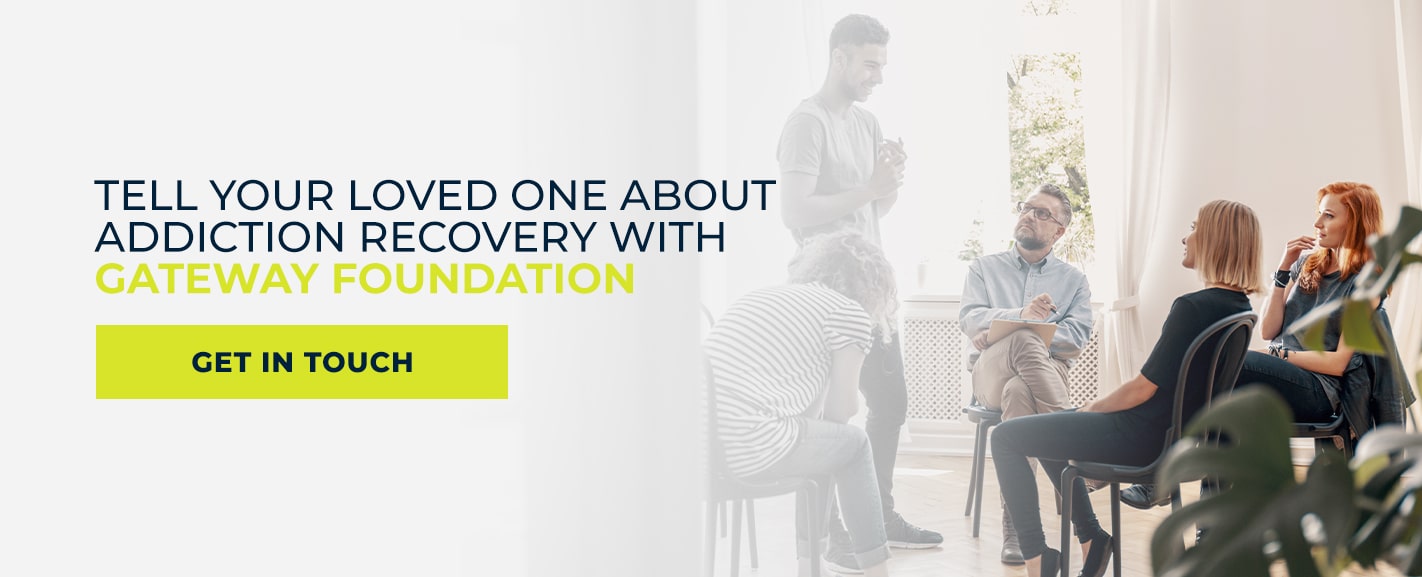- Nov 3
- Drug Addiction Treatment
The upheaval of life due to the pandemic has profoundly affected everyone you know coping with quarantine, especially loved ones with substance addiction.
Have you witnessed a friend who was at risk for alcohol addiction lose their job because of the pandemic, or perhaps watched a family member living a life of sobriety suddenly have to stop attending recovery group meetings due to lockdown?
Knowing that someone you care about is more susceptible to severe complications from COVID-19 and is at higher risk for relapse due to quarantine stressors can feel scary. The good news is, you can start employing effective strategies right now to help protect your loved one and support their recovery, even in lockdown.
Are you ready to explore how to help someone with drug addiction or alcohol misuse during quarantine? Read on to learn how.
- Higher COVID-19 Risk With Drug Use
- The Link Between Substance Use and the COVID-19 …
- How to Help Someone Recovering From Addiction …
- Living With a Person in Recovery in Quarantine
- Providing Social Distance Support for Someone …
- How to Help Someone With Addiction in Quarantine
- Tell Your Loved One About Addiction Recovery…
Higher COVID-19 Risk With Drug Use
People with compromised immune systems face a higher risk for contracting or suffering more adverse reactions from COVID-19. As the pandemic continues to have lasting effects, people with weakened immune systems need the most protection — those with existing health conditions, the elderly and people with substance abuse disorders.
The NIDA reports that people who use drugs are more likely to get severely ill from COVID-19. The use of opioids, stimulants and other substances can have severe effects on the body, including:
- Difficulty breathing
- Decreased oxygen intake
- Heart and lung damage
These conditions increase the risk of severe illness and death for people who contract COVID-19.
The Link Between Substance Use and the COVID-19 Pandemic
The pandemic generated a surge in alcohol consumption, with alcohol sales rising at least 24% since shutdowns began. The CDC reports that as of June 2020, at least 13% of Americans started or increased substance use to cope with the emotions related to COVID-19.
The following factors link coronavirus and addiction, creating new triggers and intensifying existing stressors.
- Isolation: Months of stay-at-home orders can cause people to experience depression and loneliness, which may intensify the desire to drink or use substances.
- Stress: COVID-19 has created financial and life instability for thousands of people. Approximately 39% of adults lost their jobs or had work hours cut due to the pandemic. From job insecurity to concerns about health and safety, pandemic-driven anxieties have led some people to use drugs as a coping mechanism.
- Boredom: Access to healthy, stress-relieving social outlets likevisiting with friends, going to the movies or attending baseball games suddenly ceased. The monotony of spending day after day inside can create a cabin fever environment, with some turning to alcohol as an attempt to escape the boredom.
How to Help Someone Recovering From Addiction in Quarantine
Whether you live with a person recovering from addiction or want to assist while social distancing, use these tips to help prevent substance use and actively participate in their recovery plan.
Living With a Person in Recovery in Quarantine
- Communicate daily: You may live under the same roof, yet not all communication is equal. To help a loved one who is recovering from addiction, connect intentionally and often. Talk through their struggles every day, validate their feelings and remember to practice active listening skills.
- Dive into fun activities at home: Take your mind off your problems by making entertainment at home. Play board games inside or camp out in the backyard and look at the stars. Turn the living room into a home theater, make popcorn and consider engaging in dialogue about movie themes that may help your loved one work through feelings of distress at this time.
- Get active: Take walks together — bust those cabin fever blues with a much-needed change of scenery. Miss visiting the gym? Set up a routine at home and work out together several times per week. Regular exercise releases endorphins and boosts mental health. Recent studies show people who engage in regular aerobic exercise are less likely to misuse substances or use illicit drugs.
- Try something new together: Prevent boredom with a new hobby and make the most of this time together by learning something new. Encourage your loved one to take an online class with you, try new recipes and cook together every week or start that model kit that’s been collecting dust in the closet.
- Tackle home projects: Spending more time inside is the perfect time to tackle those home projects. Make a schedule for cleaning each room as a team. Cluttered environments can lead to stress and depression. Research shows that maintaining a clean home positively impacts mental health, resulting in reduced anxiety, increased relaxation and a feeling of control. Even the simple act of washing dishes every day helps create a state of mindfulness and decreases stress.
- Use online counseling organizations and recovery support groups: People recovering from addiction are accustomed to attending counseling sessions, support groups and participating in other in-person recovery activities — and when the pandemic hit, they lost regular access to their existing support system. It is vital to continue recovery steps, especially during times of uncertainty. Help your loved one with the process of seeking professional online support from telehealth therapists and recovery organizations to discuss measures for maintaining their recovery plan at home.
Providing Social Distance Support for Someone in Recovery
- Maintain safe, regular communication: Consistent contact is essential. Talk daily by text, online messaging or phone. Schedule weekly video chats so you can see one another and connect more closely.
- Take walks while practicing social distancing: Get together to take long walks outside. Visit each other in person and soak up the sunshine while maintaining safe distancing and recommended precautions.
- Enjoy virtual hangout dates together: Watch movies together online. Make a virtual book club with a few close friends. Play video games or other activities online with your loved one. While it’s different from doing things in the same space, today’s technology allows you to enjoy many pre-quarantine activities from afar, conducted safely through the screen.
How to Help Someone With Addiction in Quarantine
If someone you know has slipped up on their sobriety during the coronavirus pandemic, reassure them that they are not alone and how they choose to respond matters. If a loved one is struggling with the possibility of an addiction relapse in lockdown, these steps can help.
- Encourage them to reflect and get back on track: Discuss why they experienced the urge to use substances. Encourage them not to feel defeated and remind them that their sobriety journey doesn’t end because of temptation or an act of relapse. Talk through their renewed commitment and ask how you can help them with their next steps.
- Increase your communication: Prevent the harm of social isolation by talking more frequently, and help them identify and reduce relapse-triggering stressors. Work together to create a healthy quarantine routine to prevent boredom and depression.
- Become an accountability partner: Remind them to take medicine as prescribed, enroll in or continue therapy and maintain appointments with professional treatment services.
- Discuss harm reduction strategies: Encourage your loved one to talk to a health care provider to discuss options to treat alcohol or opioid use disorders. A medication-assisted treatment program can implement techniques to minimize risks to themselves and others, such as lifesaving medicine to reduce cravings and support withdrawal. Attempts to stop substance misuse without medical supervision can be dangerous, especially during COVID-19. If withdrawal symptoms have an adverse effect, prompt treatment at a standard medical provider could be challenging to achieve due to the pandemic’s burden on the health care system.
- Facilitate treatment enrollment: If someone you know struggles with addiction, relapse or withdrawal during quarantine, encourage them to seek professional help. Since alcohol and drug addiction weakens the immune system, immediate treatment is necessary to improve health and defend against COVID-19. Substance abuse treatment centers are essential services — so you can reassure your loved one that it is safe to pursue virtual or in-person treatment from facilities at this time.
Tell Your Loved One About Addiction Recovery With Gateway Foundation
We understand that navigating quarantine isolation due to COVID-19 can be challenging, especially for someone with a substance use disorder. If someone you care about is struggling with drug or alcohol addiction, you are not alone — and there is hope.
Our patients’ safety is our utmost priority. We vigilantly maintain all protective recommendations from the CDC to continue to provide leading care, from telehealth services to in-patient treatment. With more than 50 years of experience providing compassionate care, you can trust our medical professionals to treat addiction safely during and after the pandemic. Gateway Foundation offers personalized treatment for our patients to support them for their entire recovery journey, including medically supervised withdrawal.
If you or your loved one want more information about seeking or maintaining recovery during quarantine, don’t wait. Contact us today to start your path to recovery.




